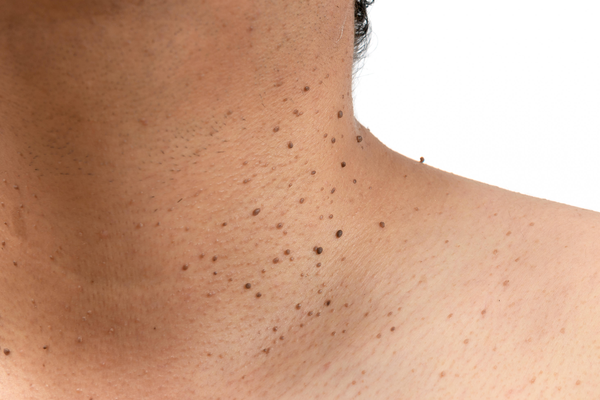Skin Tags - Symptoms, Causes, Prevention & Homeopathic treatment

Overview
Skin tags, medically known as acrochordons, are benign, soft growths that hang off the skin. These common, noncancerous skin growths often appear in areas where the skin folds, such as the neck, armpits, groin, and under the breasts. Although skin tags are generally harmless and painless, they can be cosmetically bothersome or cause discomfort if irritated.
Symptoms
Skin tags are typically identified by their distinctive appearance:
- Small, Soft Growths: They are small, flesh-colored or slightly darker growths that hang off the skin.
- Pedunculated: Skin tags are often attached to the skin by a small, thin stalk (peduncle).
- Smooth or Wrinkled: They can be smooth or slightly wrinkled and may vary in texture.
- Painless: Generally, skin tags are not painful unless they are irritated by clothing, jewelry, or frequent friction.
When to See a Doctor
Although skin tags are benign, there are certain situations when medical advice should be sought:
- Changes in Appearance: If a skin tag changes in color, size, or shape.
- Pain or Discomfort: If the skin tag becomes painful, bleeds, or shows signs of infection.
- Location Concerns: If the skin tag is in an area where it is frequently irritated or causes discomfort.
- Cosmetic Reasons: For cosmetic concerns or if the skin tag is causing psychological distress.
Causes
The exact cause of skin tags is not well understood, but several factors may contribute to their development:
- Friction: Repeated friction from skin rubbing against skin or clothing can contribute to the formation of skin tags.
- Genetics: A family history of skin tags can increase the likelihood of developing them.
- Hormonal Changes: Hormonal fluctuations, such as those occurring during pregnancy, can increase the risk of skin tags.
- Insulin Resistance: Conditions like obesity and type 2 diabetes, which are associated with insulin resistance, can increase the risk of developing skin tags.
Risk Factors
Certain factors increase the likelihood of developing skin tags:
- Age: Skin tags are more common in middle-aged and older adults.
- Obesity: Higher body weight can increase skin folds and friction, leading to skin tags.
- Diabetes: Insulin resistance and diabetes are associated with a higher prevalence of skin tags.
- Family History: A genetic predisposition can increase the risk.
- Hormonal Changes: Pregnancy and other hormonal changes can increase susceptibility.
Complications
While skin tags are generally harmless, complications can arise:
- Irritation and Bleeding: Skin tags can become irritated and bleed if they are frequently rubbed or snagged.
- Infection: Rarely, an irritated skin tag can become infected.
- Misdiagnosis: Occasionally, other skin conditions or growths may be mistaken for skin tags, necessitating proper diagnosis.
Preventions
Preventing skin tags involves minimizing friction and maintaining good skin health:
- Maintain Healthy Weight: Keeping a healthy weight can reduce skin folds and friction.
- Avoid Tight Clothing: Wearing loose-fitting clothes can minimize friction.
- Good Skin Hygiene: Regular cleansing and moisturizing can help maintain healthy skin.
- Monitor Skin Changes: Regularly check the skin for new growths or changes in existing skin tags.
Can Homeopathy Help?
Homeopathy offers a holistic approach to managing skin tags, focusing on stimulating the body’s natural healing processes. Homeopathic remedies are selected based on individual symptoms and overall health.
Common Homeopathic Remedies for Skin Tags
- Thuja Occidentalis: Frequently used for skin growths, including skin tags and warts.
- Calcarea Carbonica: Suitable for individuals with skin tags and a tendency toward obesity.
- Causticum: Effective for removing skin tags that are painful or bleed.
- Dulcamara: Used for skin tags that develop in moist areas or during damp weather.
- Nitricum Acidum: For skin tags that are sensitive to touch and bleed easily.
A qualified homeopathic practitioner will conduct a thorough assessment to select the most appropriate remedy based on the individual’s overall health, specific symptoms, and underlying causes.
Diagnosis
Diagnosing skin tags typically involves a simple physical examination. However, in some cases, additional tests may be required to rule out other skin conditions:
- Physical Examination: A doctor examines the growth to confirm it is a skin tag.
- Biopsy: If there is any doubt, a biopsy may be performed to ensure the growth is benign.
Treatments
While skin tags are harmless, they can be removed if they cause discomfort or cosmetic concerns.
Conventional Treatments
- Cryotherapy: Freezing the skin tag with liquid nitrogen.
- Cauterization: Burning off the skin tag using electrolysis.
- Ligation: Tying off the skin tag to cut off its blood supply, causing it to fall off.
- Excision: Cutting off the skin tag with a sterile surgical blade.
Homeopathic Treatments
Homeopathic treatments focus on individual symptoms and overall health. Commonly used remedies include:
- Thuja Occidentalis: For various skin growths, including skin tags.
- Calcarea Carbonica: For individuals with skin tags and obesity.
- Causticum: For painful or bleeding skin tags.
- Dulcamara: For skin tags in moist areas or during damp weather.
- Nitricum Acidum: For sensitive and bleeding skin tags.
Lifestyle and Home Remedies
Certain lifestyle changes and home remedies can help manage skin tags:
- Avoid Irritation: Minimize friction by wearing loose-fitting clothing and avoiding tight accessories.
- Cleanliness: Keep the skin clean and dry to prevent irritation.
- Natural Remedies: Some people find relief using natural remedies like tea tree oil or apple cider vinegar, but these should be used with caution and professional guidance.
Preparing for Your Appointment
To make the most of your appointment with a healthcare provider or homeopathic practitioner:
- Document Symptoms: Keep a detailed record of your symptoms, including their onset, duration, and any triggers.
- Medical History: Provide information about your personal and family medical history, including any history of skin tags.
- Questions: Prepare questions about treatment options, potential side effects, and lifestyle changes to manage skin tags.
- Current Medications: List any current medications or supplements you are taking, including any topical treatments.
